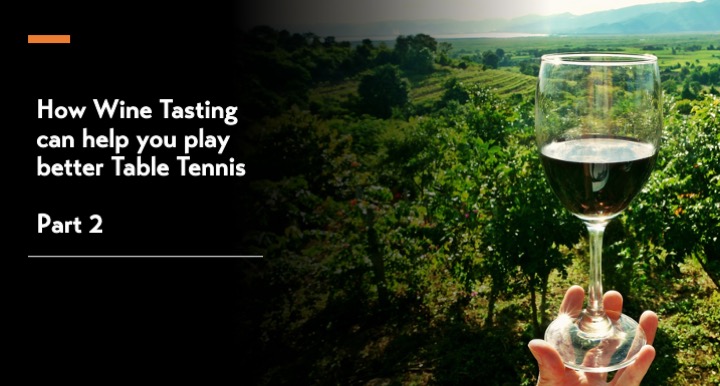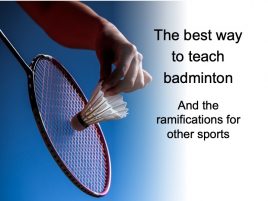
How Wine Tasting can help you play better Table Tennis. Part 2
Remember our experiment from Part 1?
We had two equal groups of untrained wine drinkers and they all tasted a particular wine.
While one group wrote a description of the wine, the other group did a crossword.
A bizarre result
In the experiment [1] the two equal groups of untrained wine drinkers were then given four wines to taste. One of the wines was the very wine they’d just tasted. All they had to do was pick the first wine they’d tasted from the four wines.
The group who had the supposed benefit of writing a description of the first wine they’d tasted, didn’t do a good job of picking the wine. Basically, they did no better than just guessing.
On the other hand, the drinkers who did the crossword did really well. They almost did as good as a trained wine taster.
We then had a quick look at how the drinkers who put the features of the first wine into words, had unknowingly created a distinct neural network of Verbal Memories. And when it came to recognising the wine out of the line-up, there was competition between the Verbal Memories and the Olfactory Memories. And this competition got in the way of them correctly identifying the wine. Now onto to Verbal Overshadowing
Verbal Overshadowing
The drinkers who wrote a description of the wine were victims of Verbal Overshadowing. Their minds became cluttered with inputs from the two competing neural networks.
And all to the point where their Olfactory Network was overshadowed and dominated by their Verbal Network. And remember it’s our Olfactory Memory we rely on to distinguish one wine from another.
In contrast, the drinkers who did the crossword were prevented from creating Verbal Memories of the sample wine’s defining features. There was no competition between the two memory networks. And hence, no Verbal Overshadowing.
So yes, writing down information can be a very useful way of learning something. And having it stored away for retrieval later. But here’s the thing, it’s not always useful. In fact, it can sometimes get in the road.
The same problem happens in sport
If we want to be better at playing Table tennis, or any sport for that matter, we need to learn something from this research. It’s because sport is not immune from Verbal Overshadowing.
We probably don’t need to be too concerned about Verbal Memories overshadowing Olfactory Memories – as we do in the case of wine tasting. However, we do need to be concerned about Verbal Memories overshadowing some critical Visual Memories.
Visual Memories include those of your opponent’s windup and the flight of the ball. You need both of these so you can predict where the ball is going to end up. And if Verbal Memories overshadow them, it can cause your game to deteriorate.
So how do you make sure it doesn’t happen?
In a nutshell: as a player, cut down on the number of words going around in your brain and be more visual. And as a coach? The answer is don’t speak too much or, if you like, don’t use too many words. But of course, that’s a lot more to it than that.
The research tells us what you need to do less of and what you need to do more of. And I’ve been collecting it, analysing it and putting it in words we can all understand and use.
So keep tuned and all the very best,
Roger.
[1] Melcher J.M. & Schooler J.W. The misremembrance of wines past: verbal and perceptual expertise differentially mediate verbal overshadowing of taste memory. Journal of Memory and Language, 35, 231-245, 1996.



